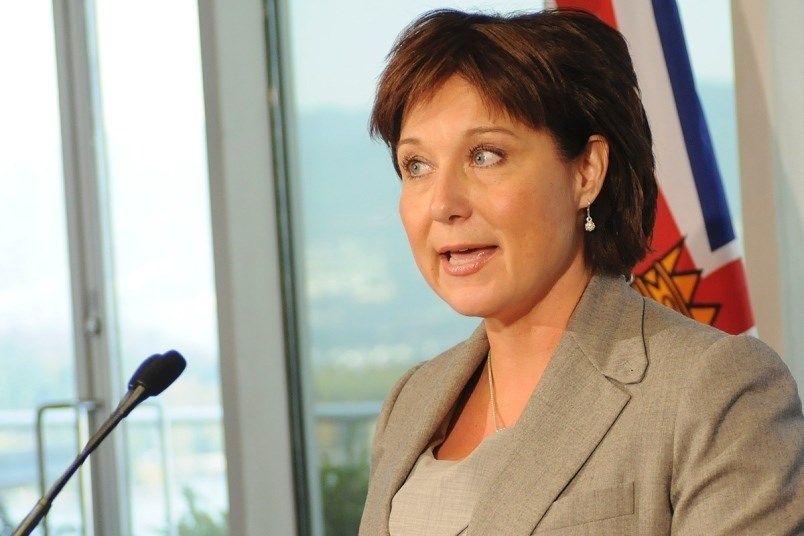In what Premier Christy Clark said was an effort to address the housing affordability crisis in B.C., she announced Thursday a new $703-million program that aims to help first-time homebuyers pay for a down payment on a house that costs no more than $750,000.
Clark said the government program, which will run for three years, will match what a prospective buyer has already saved for a down payment by providing up to $37,500 or five per cent of the purchase price of a home. The 25-year loan will be interest-free for the first five years and set at the market rate for the remainder of the loan.
“I firmly believe that the dream of home ownership must stay within the reach of the middle class here in British Columbia,” Clark told reporters from a new housing development in Surrey. “We must make sure it is easier for first-time homebuyers to find their way into a really tough housing market.”
A prospective buyer or buyers must have a household income of no more than $150,000, be a Canadian citizen or permanent resident for at least five years and have lived in B.C. for one year. Buyers must be pre-approved for an insured high-ratio mortgage, meaning a down payment is less than 20 per cent of the home price.
Called the B.C. Home Owner Mortgage and Equity Partnership, the rules state owners must make the home their principal residence for the first five years, unless the loan is repaid in full sooner than that time period.
Examples provided by government of how the program would work included the scenario of a prospective buyer of a $475,000 condo. That buyer, who had saved half of the minimum required down payment of $11,875, could apply to the government program for an equal amount to then meet the high-ratio mortgage requirement.
Government data suggests an estimated 42,000 households could take advantage of the program, which begins taking applications in January. Sales data for Metro Vancouver that covers 11 months of this year indicates 87 per cent of apartments and 72 per cent of townhomes sold within the $750,000 limit set in the government program.
In taking questions from reporters, Clark said she didn’t think the program would drive up housing prices.
“Our analysis tells us that it won’t because everybody who is going to be eligible for this program will have to have been accepted for a mortgage already,” the premier said. “So they’ll all be people who can afford to buy a home.”
David Eby, NDP MLA for Vancouver-Point Grey and his party’s housing critic, called the government program “bizarre” and that it will benefit developers of new homes and saddle potential homebuyers with more debt in what is already an expensive province to live.
“I can’t believe that the government’s response to people not being able to get into the housing market is to facilitate and encourage them to take on more debt,” Eby told the Courier. “Young people and young families trying to get into the housing market have credit card debt, they have student loan debt — they have record levels of debt, according to the Conference Board of Canada.”
Eby said the government had large parcels of land at Oakridge, Little Mountain and at Jericho that it could have used to build mixed-income communities, but instead sold it. Eby agreed with Clark’s comment to reporters Thursday that municipalities have to find ways to speed up permits so more housing can be built.
“But that doesn’t change this reality that this approach is so out of step with what’s happening,” Eby said.
The Bank of Canada warned in a report Thursday that Canadian households continue to hold high levels of debt and housing markets remain imbalanced. The Bank’s governor, Stephen Poloz, said in a speech that “macroeconomic shocks” happen all the time in the economy but can be magnified when “underlying vulnerabilities” arise.
“The metaphor we have used is that of a large tree with a crack in it — the situation may improve or worsen over time, but there’s no immediate crisis until the wrong sort of storm comes along,” he said.
Clark said the government can afford to fund the program because B.C. has the strongest economy in Canada. The premier said government will pay for the program with money collected from property purchase taxes, including the foreign buyers’ tax and the luxury home tax.
The same month the program begins, residents will receive property assessments. Higher assessments could mean hundreds, if not thousands, of residents could lose their homeowner grant. Clark wouldn’t say Thursday whether government plans to step in and raise the $1.2-million eligibility threshold to avoid what reportedly could mean thousands of Vancouverites losing the grant, which reduces the amount of property tax a homeowner pays.
“That’s a decision for another day,” Clark said.
@Howellings



